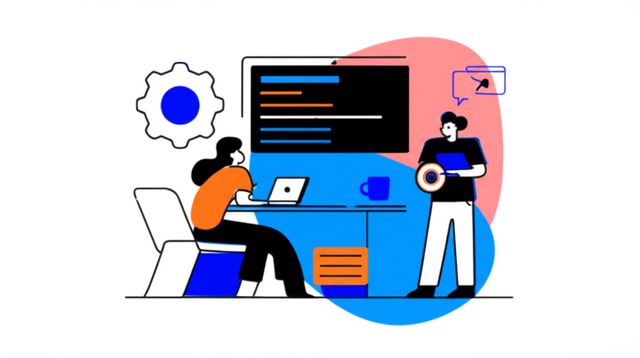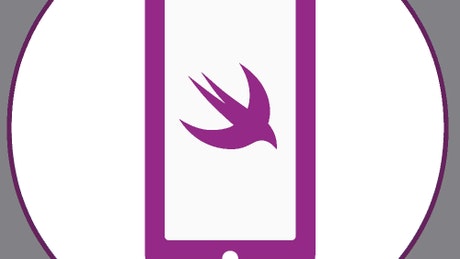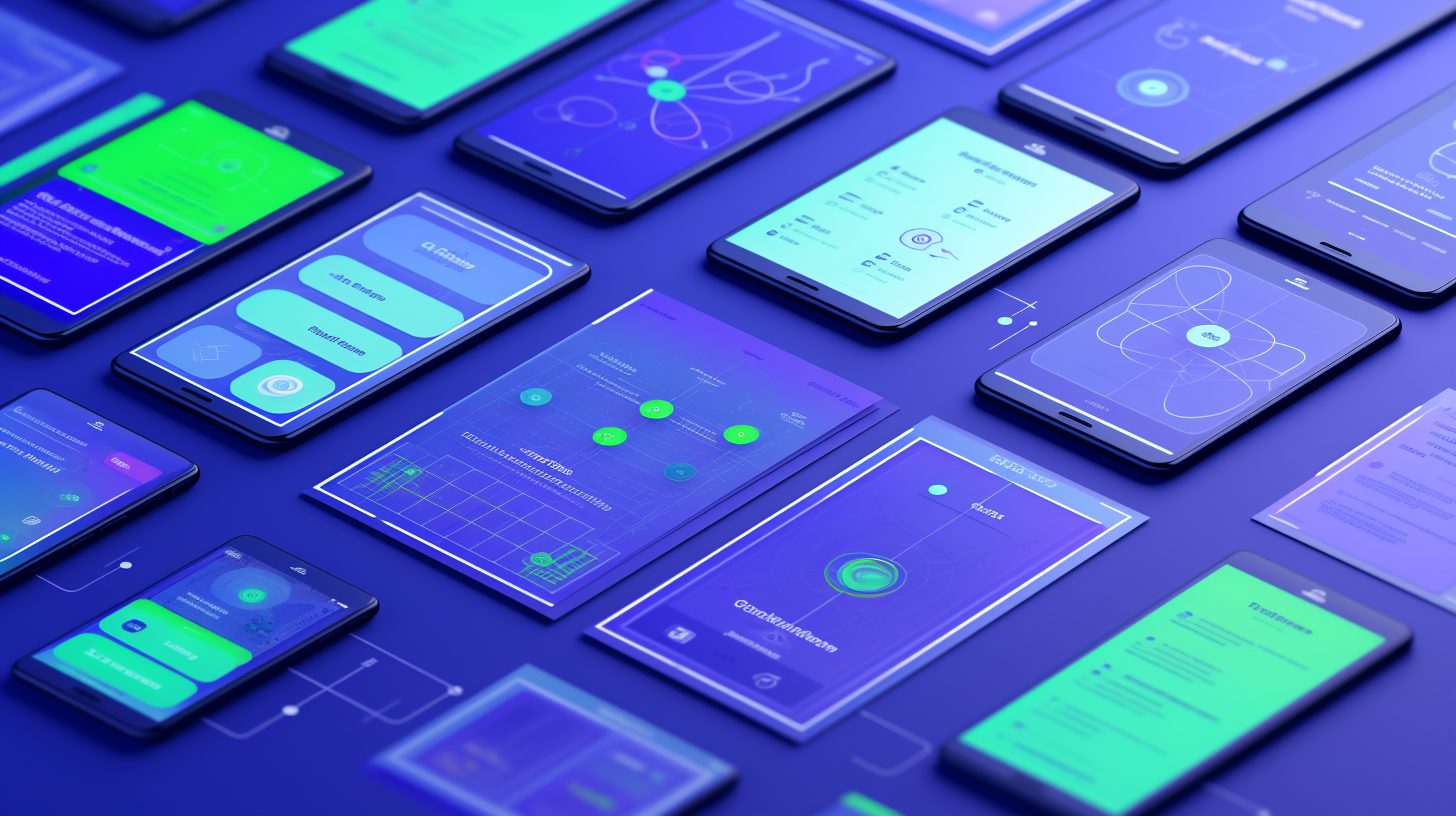iOS Development
Diving into iOS Development: A Comprehensive Guide
iOS development is the process of creating applications specifically for Apple's mobile operating system, which powers devices like the iPhone and iPad. It involves designing, building, and maintaining these applications, often referred to as "apps." This field offers a unique blend of creativity and technical skill, allowing developers to craft engaging user experiences and bring innovative ideas to life.
Working in iOS development can be an exciting prospect for several reasons. Firstly, you have the opportunity to create applications that can reach a vast audience, given the popularity of Apple devices. Secondly, the process of designing intuitive user interfaces and implementing unique features can be incredibly fulfilling. Finally, the iOS ecosystem is known for its high standards and potential for monetization, offering developers a chance to build successful and impactful products.
Introduction to iOS Development
Embarking on a journey into iOS development can be an exciting endeavor. This field focuses on creating software for the ecosystem of Apple devices that many people use daily. Understanding the fundamentals of what iOS development entails, the role developers play, and where these applications are used is the first step in exploring this dynamic career path.
Definition and scope of iOS development
At its core, iOS development is the process of building and maintaining software applications for Apple's mobile operating system (iOS). This operating system is the foundation for popular devices such as the iPhone, iPad, and iPod Touch. Developers in this field create a wide array of applications, ranging from games and social media platforms to productivity tools and business-centric solutions.
The scope of iOS development is extensive. It encompasses the entire lifecycle of an app, from the initial concept and design phases to coding, testing, deployment to the App Store, and ongoing maintenance and updates. Developers work with specific programming languages and tools provided by Apple to bring these applications to life, ensuring they function smoothly and provide a positive user experience.
Role of iOS developers in the tech ecosystem
iOS developers are crucial players in the technology world. They are the architects and builders of the applications that run on millions of Apple devices worldwide. Their primary role involves translating ideas and requirements into functional and user-friendly mobile applications. This includes writing code, debugging issues, and ensuring the app performs efficiently.
Beyond just coding, iOS developers often collaborate closely with designers, product managers, and other stakeholders to ensure the final product aligns with user needs and business goals. They contribute to the innovation within the mobile app space, constantly seeking new ways to leverage the capabilities of Apple's hardware and software to create compelling experiences. The demand for skilled iOS developers remains high, reflecting their importance in an increasingly app-driven world.
Key industries and applications for iOS apps
iOS applications permeate a vast number of industries. In the realm of e-commerce, apps provide seamless shopping experiences. The gaming industry heavily relies on iOS for delivering immersive and interactive entertainment. Financial services leverage iOS apps for secure banking and investment management.
Furthermore, sectors like healthcare utilize iOS apps for patient monitoring and information access. Education benefits from interactive learning applications. Social networking platforms thrive on iOS, connecting millions of users. Productivity apps help individuals and businesses manage tasks and workflows efficiently. The versatility of iOS allows developers to create tailored solutions for virtually any industry, making it a field with diverse opportunities.
Core Concepts in iOS Development
To build applications for Apple's ecosystem, a solid understanding of fundamental concepts is necessary. This includes familiarity with the primary programming languages, the development environment, common architectural patterns, and the frameworks that provide the building blocks for user interfaces. Mastering these core concepts is essential for any aspiring or practicing iOS developer.
Programming languages (Swift, Objective-C)
Two primary programming languages form the backbone of iOS development: Swift and Objective-C. Swift, introduced by Apple in 2014, is a modern, powerful, and intuitive language designed to be safe, fast, and expressive. It has quickly become the preferred language for new iOS projects due to its clean syntax, strong typing, and performance advantages. Many developers find Swift easier to learn and work with, leading to faster development cycles.
These courses offer a great starting point for learning Swift, the modern language for iOS development.
Objective-C is the older of the two languages, with roots extending back to the early 1980s. It is a superset of the C programming language and adds object-oriented capabilities. For many years, Objective-C was the primary language for all Apple development. While Swift is now favored for new development, a vast amount of existing iOS code is written in Objective-C, meaning that familiarity with it can still be valuable, especially when maintaining or extending older applications.For those interested in understanding Objective-C, particularly for working with legacy codebases, these resources can be beneficial.
iOS SDK and Xcode IDE
The iOS SDK (Software Development Kit) provides a comprehensive set of tools, libraries, and resources that developers use to build, test, and debug iOS applications. It includes a wide range of frameworks that offer pre-built functionalities, such as user interface elements, data management, networking capabilities, and access to device hardware like the camera and GPS. Apple regularly updates the SDK, introducing new features and improvements that developers can leverage.
Xcode is Apple's official Integrated Development Environment (IDE) for all Apple platforms, including iOS. It is an essential tool for iOS developers, providing a complete workflow for coding, designing user interfaces, testing, debugging, and submitting apps to the App Store. Xcode includes a powerful code editor, a visual interface builder (Interface Builder), a debugging console, and a simulator that allows developers to test their apps on various virtual Apple devices. Proficiency in Xcode is a fundamental requirement for iOS development.Many comprehensive iOS development courses will guide you through using Xcode and the iOS SDK.
Model-View-Controller (MVC) architecture
The Model-View-Controller (MVC) pattern is a common architectural design pattern used in iOS development to organize code and separate concerns. It divides an application into three interconnected components:
The Model represents the application's data and business logic. It is responsible for managing the data, processing it, and enforcing any rules associated with it. The Model is independent of the user interface.
The View is what the user sees and interacts with. It displays the data from the Model and sends user actions (like taps or swipes) to the Controller. The View should not contain any application logic.
The Controller acts as an intermediary between the Model and the View. It receives user input from the View, processes it (often by interacting with the Model), and then updates the View to reflect any changes in the Model.
Using the MVC pattern helps to create more modular, maintainable, and testable code. While it's a foundational pattern, other patterns like MVVM (Model-View-ViewModel) have also gained popularity in the iOS community.
Understanding design patterns like MVC is crucial for building well-structured iOS applications. These resources provide deeper insights.
UIKit and SwiftUI frameworks
For building the user interface (UI) of iOS apps, developers primarily use one of two frameworks provided by Apple: UIKit or SwiftUI.
UIKit has been the traditional framework for iOS UI development for many years. It provides a comprehensive set of classes for creating and managing all aspects of an app's visual presentation and user interaction. UIKit uses an imperative approach, where developers explicitly write code to create, modify, and manage UI elements and their states. It offers a high degree of control and flexibility and has a vast ecosystem of third-party libraries and resources.Courses focusing on UIKit provide a strong foundation in traditional iOS UI development.
SwiftUI, introduced more recently, is a modern, declarative framework for building UIs across all Apple platforms. With SwiftUI, developers describe what the UI should look like based on the current state of the data, and the framework automatically updates the UI when the state changes. This declarative approach can lead to more concise and easier-to-read code, especially for complex UIs. SwiftUI is gaining rapid adoption and is seen by many as the future of UI development on Apple platforms.For those looking to learn the modern, declarative approach to UI development, these SwiftUI courses are excellent choices.
Formal Education Pathways
For individuals considering a structured academic route into iOS development, several formal education pathways can provide a strong foundation. These typically involve university-level studies in computer science or related fields, offering comprehensive theoretical knowledge and practical skills applicable to mobile development.
Relevant undergraduate/graduate degrees (CS, software engineering)
A bachelor's degree in Computer Science (CS) or Software Engineering is a common educational background for iOS developers. These programs typically cover fundamental programming concepts, data structures, algorithms, software development methodologies, and operating systems, all of which are highly relevant to building complex mobile applications. Some universities may even offer specialized tracks or courses in mobile application development.
A computer science degree provides a deep understanding of the theoretical underpinnings of software, while a software engineering degree often emphasizes the practical aspects of designing, developing, and maintaining software systems. Both can equip students with the problem-solving skills and technical proficiency needed to tackle the challenges of iOS development. While a degree isn't always a strict requirement to enter the field, it can provide a competitive edge and a solid theoretical base.
Many individuals in the field have a background in these disciplines. If you're exploring university options, look for programs with strong software development components.
University courses covering mobile development
Many universities now offer specific courses or modules focused on mobile development, sometimes with a direct emphasis on iOS. These courses delve into the specifics of mobile platforms, including UI/UX design principles for mobile, mobile-specific programming paradigms, and the use of platform-specific SDKs like the iOS SDK. Students in such courses often get hands-on experience building mobile applications as part of their coursework.
These specialized mobile development courses, whether part of a broader CS degree or as standalone offerings, can provide targeted knowledge and practical skills directly applicable to an iOS development career. They often cover topics like working with mobile databases, networking on mobile devices, and understanding the lifecycle of mobile applications. Look for university programs that incorporate project-based learning, as this is an excellent way to gain practical experience.
If you are currently a university student, exploring courses related to mobile computing or application development can be highly beneficial.
record:39
Research opportunities in mobile computing
For those inclined towards academia or cutting-edge innovation, research opportunities in mobile computing can be an exciting path. Universities with strong computer science departments often have research labs focusing on various aspects of mobile technology. This can include areas like human-computer interaction on mobile devices, mobile security and privacy, performance optimization for mobile applications, novel mobile sensing applications, or the intersection of mobile computing with fields like artificial intelligence and the Internet of Things (IoT).
Engaging in research can involve working on projects that push the boundaries of what's possible with mobile technology, potentially contributing to new frameworks, tools, or paradigms in iOS development or the broader mobile ecosystem. Graduate studies (Master's or Ph.D.) are typically the route to more in-depth research involvement. These opportunities can lead to careers in academia, industrial research labs, or advanced development roles where a deep understanding of underlying principles is valued.
Self-Directed and Online Learning
For those who prefer a more flexible approach or are looking to transition careers, self-directed learning and online resources offer a wealth of opportunities to gain iOS development skills. This path emphasizes practical application and building a demonstrable portfolio of work. Many successful iOS developers have forged their careers through these non-traditional routes.
OpenCourser is an excellent platform to begin your search for suitable online courses. With a vast catalog of courses from various providers, you can easily browse programming courses and find options that fit your learning style and goals. Features like course summaries, user reviews, and the ability to save courses to a list make it simpler to compare and select the best resources for your iOS development journey.
Benefits of project-based learning
Project-based learning is an incredibly effective way to master iOS development. Instead of passively consuming information, you actively apply concepts by building real applications. This hands-on approach helps solidify your understanding of programming languages like Swift, frameworks like SwiftUI or UIKit, and development tools like Xcode. When you encounter challenges and work through them to complete a project, you develop critical problem-solving skills that are highly valued in the industry.
Moreover, completed projects serve as tangible proof of your abilities. These can range from simple utility apps to more complex applications, each demonstrating different facets of your skillset. Building a diverse portfolio of projects is often more impactful to potential employers than certifications alone. Each project you undertake is a learning experience that directly contributes to your practical knowledge and confidence as a developer.
Many online courses are structured around project-based learning, allowing you to build a portfolio as you learn. These courses emphasize hands-on experience.
record:34
Balancing online resources with practical experience
While online courses, tutorials, and documentation are invaluable resources, they are most effective when balanced with consistent practical application. It's one thing to understand a concept intellectually, but another to implement it correctly in a working application. Regularly coding, experimenting with new features, and even trying to replicate functionalities from existing apps can significantly accelerate your learning.
Consider contributing to open-source projects or collaborating with other learners on small projects. This not only provides practical experience but also exposes you to different coding styles, best practices, and the dynamics of working in a team environment. The key is to move beyond simply following tutorials and start creating your own solutions and tackling unique problems. This proactive approach to learning is what truly builds expertise.
These books offer structured knowledge that can complement your hands-on projects, providing deeper understanding of core principles.
Certifications vs. portfolio building
When it comes to demonstrating your iOS development skills, particularly for those who are self-taught or transitioning careers, a strong portfolio often carries more weight than certifications. While certifications can indicate a certain level of knowledge, a portfolio showcases your actual ability to build functional, well-designed applications. Employers are generally more interested in seeing what you can do rather than what courses you've completed.
Your portfolio should ideally include a variety of projects that highlight different skills, such as UI/UX design implementation, working with APIs, data persistence, and problem-solving. Each project should be well-documented, perhaps with a brief explanation of the technologies used and the challenges you overcame. While some specialized certifications might be valuable in certain niches, investing time in building a robust and diverse portfolio is generally the most effective way to impress potential employers and land a job in iOS development. If you're looking for ways to enhance your resume, OpenCourser's Learner's Guide offers articles on topics like adding certificates to your LinkedIn profile.
Courses that culminate in a capstone project can be particularly valuable for portfolio building.
iOS Development Career Pathways
The field of iOS development offers a structured and rewarding career path with opportunities for growth and specialization. As developers gain experience and expertise, they can progress through various roles, each with increasing responsibility and complexity. Understanding this progression can help aspiring developers set realistic goals and navigate their careers effectively.
If you're interested in pursuing this path, consider exploring the specific role of an iOS Developer.
Entry-level roles (Junior iOS Developer)
Most individuals begin their iOS development careers in entry-level positions, often titled Junior iOS Developer. In these roles, developers typically work under the supervision of more senior team members, focusing on learning the codebase, fixing bugs, implementing smaller features, and gaining familiarity with the team's development processes and tools. Entry-level developers are expected to have a foundational understanding of Swift or Objective-C, familiarity with Xcode, and basic knowledge of iOS SDK frameworks.
This stage is crucial for building practical experience and honing technical skills. While a computer science degree can be beneficial, many employers prioritize a strong portfolio of personal projects and demonstrable coding ability, especially for candidates without a traditional academic background. Internships can also serve as a valuable stepping stone into a junior role. The job market for entry-level positions can be competitive, so a well-crafted resume and a portfolio showcasing your passion and skills are essential.
These courses are designed to equip you with the fundamental skills needed for an entry-level iOS development role.
Mid-career specialization (UX/UI, AR/VR)
As iOS developers gain a few years of experience, they typically progress to mid-career roles, often simply titled iOS Developer or Software Engineer. At this stage, they take on more responsibility, designing and developing more complex features and applications, and may begin to mentor junior developers. Mid-level developers are expected to have a strong command of iOS technologies and best practices.
This is also a point where developers might choose to specialize in particular areas of iOS development. For instance, some may focus on User Experience (UX) and User Interface (UI) development, working closely with designers to create visually appealing and intuitive applications. Others might delve into emerging technologies like Augmented Reality (AR) using ARKit, or even explore areas like Virtual Reality (VR) if the projects demand it. Specialization can lead to deeper expertise and open doors to more niche and potentially higher-paying opportunities.
For those interested in specializing, these courses explore advanced topics and specific frameworks like ARKit.
You may also wish to explore related career paths if you have an interest in these specializations.
Leadership roles (Tech Lead, Engineering Manager)
With significant experience and a proven track record, iOS developers can advance into leadership positions such as Senior iOS Developer, Tech Lead, or Engineering Manager. Senior developers are typically experts in their field, responsible for architectural decisions, leading complex projects, and mentoring other developers.
Tech Leads often guide the technical direction of a specific project or team, ensuring best practices are followed and technical challenges are overcome. Engineering Managers take on more people-management responsibilities, overseeing teams of developers, managing project timelines and resources, and contributing to the overall engineering strategy of the organization. These roles require not only strong technical skills but also excellent communication, leadership, and project management abilities. The career path can also lead to roles like iOS Architect, who designs the high-level structure of iOS applications.
These more advanced courses can help experienced developers prepare for leadership responsibilities and tackle complex architectural challenges.
Consider these books for in-depth knowledge on advanced Swift concepts and data management.
Industry Trends Shaping iOS Development
The landscape of iOS development is constantly evolving, driven by technological advancements and changing user expectations. Staying abreast of these trends is crucial for developers to remain competitive and build cutting-edge applications. Several key trends are currently shaping the future of how iOS apps are conceived, built, and experienced.
Impact of AI/ML integration
Artificial Intelligence (AI) and Machine Learning (ML) are increasingly making their way into iOS applications, enabling more intelligent, personalized, and predictive user experiences. Apple provides developers with powerful tools like Core ML and Create ML, which simplify the integration of pre-trained machine learning models into apps. This allows apps to perform tasks such as image and speech recognition, natural language processing, and anomaly detection directly on the device, often leveraging the dedicated Neural Engine in Apple hardware for enhanced performance.
The integration of AI/ML is leading to smarter features in apps, from more accurate recommendations in e-commerce and content platforms to advanced photo and video editing capabilities, and more responsive virtual assistants like Siri. Developers who can effectively incorporate AI/ML functionalities into their iOS apps are becoming increasingly valuable. This trend is expected to continue, with AI/ML playing an even more significant role in shaping the capabilities of future iOS applications.
These courses can provide an introduction to integrating machine learning into iOS applications.
Adoption of SwiftUI and declarative programming
SwiftUI, Apple's modern declarative UI framework, is steadily gaining traction and transforming how developers build user interfaces for iOS and other Apple platforms. Unlike the imperative approach of UIKit, SwiftUI allows developers to define their UI based on application state, with the framework automatically handling updates when the state changes. This often results in more concise, readable, and maintainable code, especially for complex and dynamic interfaces.
The adoption of SwiftUI is being driven by its cross-platform capabilities (build UIs for iOS, macOS, watchOS, and tvOS with a shared codebase), its tight integration with Xcode's design tools, and its modern syntax. While UIKit remains relevant and widely used, especially for existing projects and certain advanced customizations, SwiftUI is increasingly becoming the go-to choice for new app development. Developers proficient in SwiftUI are well-positioned for future opportunities in the Apple ecosystem.
To stay current with UI development trends, exploring SwiftUI is highly recommended.
record:6]
Privacy-focused app design (App Tracking Transparency)
User privacy has become a paramount concern in the digital age, and Apple has been at the forefront of implementing stricter privacy measures on its platforms. A significant development in this area is App Tracking Transparency (ATT), a framework that requires apps to get explicit user consent before tracking their activity across other companies' apps and websites for advertising purposes. This has had a profound impact on how apps handle user data and conduct targeted advertising.
Beyond ATT, developers are increasingly expected to adopt a privacy-focused approach to app design. This means minimizing data collection to only what is essential for the app's functionality, being transparent with users about how their data is used, and implementing robust security measures to protect that data. Adherence to data protection regulations like GDPR (General Data Protection Regulation) and CCPA (California Consumer Privacy Act) is also critical. iOS developers need to be well-versed in these privacy principles and regulations to build trust with users and ensure compliance.
Challenges in iOS Development
While iOS development offers many exciting opportunities, it also comes with its own set of challenges. Developers must navigate a complex ecosystem, adhere to strict guidelines, and continuously adapt to new technologies and user expectations. Understanding these challenges can help aspiring and practicing developers prepare for the realities of the field.
Fragmentation across iOS versions/devices
Although iOS is known for its relatively consistent hardware and software environment compared to Android, developers still face challenges related to fragmentation. Apple supports multiple iPhone and iPad models with varying screen sizes, processing capabilities, and hardware features. Apps need to be designed and tested to ensure they provide a good user experience across this range of devices.
Furthermore, while iOS users tend to update to the latest operating system versions more quickly than Android users, there will always be a segment of users on older iOS versions. Developers must decide which older iOS versions their app will support, balancing the desire to reach a wider audience with the effort required to maintain compatibility and address version-specific bugs. This involves careful testing and sometimes implementing conditional logic to handle differences between OS versions.
App Store review process hurdles
Getting an app published on the Apple App Store involves a review process, which can sometimes present hurdles for developers. Apple has a set of guidelines that apps must adhere to, covering aspects like safety, performance, business practices, design, and legal requirements. If an app is found to violate any of these guidelines, it may be rejected, requiring the developer to make changes and resubmit.
The review process, while intended to maintain a high-quality app ecosystem, can occasionally be a source of frustration due to perceived inconsistencies or unclear feedback. Developers need to thoroughly understand Apple's App Store Review Guidelines and be prepared to iterate on their app based on reviewer feedback. Patience and clear communication with Apple's review team can be key to navigating this process successfully.
Balancing performance with battery efficiency
Modern iOS apps are expected to be responsive, smooth, and feature-rich. However, delivering high performance must be balanced with the need to conserve battery life, which is a critical aspect of the user experience on mobile devices. Intensive tasks, frequent network requests, inefficient background processing, or poorly optimized graphics can drain a device's battery quickly, leading to user dissatisfaction.
iOS developers must employ various techniques to optimize their apps for both performance and power efficiency. This includes writing efficient code, managing memory effectively, using appropriate background modes, optimizing network usage, and leveraging tools like Xcode's Instruments to identify and address performance bottlenecks and energy hotspots. It's an ongoing challenge to deliver a rich user experience without unduly impacting the device's battery.
Ethical Considerations for iOS Developers
Beyond the technical aspects of building apps, iOS developers have a responsibility to consider the ethical implications of their work. The applications they create can have a significant impact on users' lives, their data, and even society as a whole. Adhering to ethical principles is becoming increasingly important in the tech industry.
Data privacy regulations (GDPR, CCPA)
iOS developers must be acutely aware of and comply with data privacy regulations such as the General Data Protection Regulation (GDPR) in Europe and the California Consumer Privacy Act (CCPA) in the United States. These regulations, among others globally, establish strict rules for how personal data is collected, processed, stored, and shared.
Key principles include obtaining explicit user consent for data collection, providing clear and transparent privacy policies, allowing users to access and delete their data, and implementing robust security measures to protect data from breaches. Failure to comply can result in significant fines and damage to an app's reputation. Developers need to design their apps with privacy in mind from the outset ("privacy by design") and stay informed about evolving legal requirements in different jurisdictions. Apple itself emphasizes privacy and provides guidelines and training to its employees on these matters.
Understanding and implementing data privacy best practices is non-negotiable for modern app development.
Accessibility standards compliance
Creating accessible applications is an ethical imperative and often a legal requirement. iOS provides a rich set of accessibility features and APIs that enable developers to make their apps usable by people with diverse abilities, including those with visual, auditory, motor, or cognitive impairments. This includes features like VoiceOver (a screen reader), Dynamic Type (for adjustable font sizes), and support for assistive hardware.
Developers should strive to design and build apps that adhere to accessibility standards, such as the Web Content Accessibility Guidelines (WCAG), which are often applied to mobile apps as well. This involves practices like providing alternative text for images, ensuring sufficient color contrast, making sure all functionality is accessible via keyboard or assistive technologies, and designing intuitive and predictable user interfaces. Building accessible apps not only expands the potential user base but also reflects a commitment to inclusivity.
Environmental impact of app ecosystems
While often overlooked, the app ecosystem, like all digital technologies, has an environmental footprint. This stems from the energy consumed by data centers that power app backends, the manufacturing and disposal of mobile devices, and the energy used by the apps themselves on user devices.
While individual app developers may have limited control over the broader infrastructure, they can contribute to minimizing environmental impact by optimizing their apps for energy efficiency. This includes reducing unnecessary computations, minimizing data transfer, and designing apps that don't place excessive demands on device resources, thereby potentially extending device lifespan and reducing overall energy consumption. As environmental awareness grows, the tech industry is increasingly looking for ways to build more sustainable digital products and services.
Global Opportunities in iOS Development
The demand for iOS development skills is not confined to a single geographic location. As a globally recognized platform, iOS development offers opportunities for professionals to work in various settings, including remote roles and positions in international tech hubs. Understanding these global dynamics can be beneficial for career planning.
Remote work trends
The rise of remote work has significantly impacted the tech industry, and iOS development is no exception. Many companies, from startups to large corporations, now offer remote or hybrid work arrangements for their development teams. This trend provides developers with greater flexibility in terms of location and work-life balance.
For iOS developers, this means that opportunities are no longer limited by geographical proximity to a company's physical office. Skilled developers can potentially work for companies based in different cities, states, or even countries, provided they have a reliable internet connection and the ability to collaborate effectively with distributed teams. This has broadened the talent pool for companies and expanded career options for developers.
Regional demand hotspots
While iOS development is a global field, certain regions and cities have emerged as major tech hubs with a particularly high concentration of opportunities. These "hotspots" often include areas with a strong presence of tech companies, venture capital investment, and a vibrant startup ecosystem. Examples include Silicon Valley in the United States, as well as other major cities in North America, Europe, and Asia.
The demand in these regions is often driven by a high concentration of businesses developing mobile-first strategies or requiring sophisticated iOS applications. However, with the growth of remote work, opportunities are becoming more geographically dispersed. Researching job market trends in different regions can help developers identify areas with strong demand for their skills. According to some reports, the demand for iOS developers, especially in tech startups, is on the rise.
Cultural localization challenges
When developing iOS apps for a global audience, developers and their teams face the challenge of cultural localization. This goes beyond simple language translation and involves adapting the app's content, design, and functionality to resonate with the cultural norms, preferences, and expectations of users in different regions.
For example, colors, symbols, and imagery can have different meanings across cultures. Date and time formats, currency, units of measurement, and even the layout of user interfaces may need to be adjusted. Addressing these cultural nuances is crucial for creating a positive user experience and ensuring the app's success in international markets. This often requires collaboration with localization experts and thorough testing with target user groups in different regions.
Frequently Asked Questions
Navigating the path to becoming an iOS developer or advancing in the field often brings up common questions. Addressing these directly can help provide clarity and set realistic expectations for those considering or actively pursuing this career.
Is a computer science degree necessary for iOS development?
No, a computer science degree is not strictly necessary to become an iOS developer, although it can be beneficial. Many successful iOS developers are self-taught or have come from coding bootcamps or other non-traditional educational backgrounds. Employers increasingly value practical skills, a strong portfolio of projects, and demonstrable coding ability over formal academic qualifications alone.
However, a CS degree does provide a solid theoretical foundation in programming principles, algorithms, data structures, and software engineering practices, which are all valuable in iOS development. It can also offer networking opportunities and access to university career resources. Ultimately, whether or not you pursue a degree, the key is to acquire the necessary skills, build a compelling portfolio, and continuously learn.
If you're weighing your educational options, these resources offer different perspectives on the role of formal degrees in tech.
record:29
record:30
How competitive is the job market for entry-level roles?
The job market for entry-level iOS developer roles can be competitive. While there is a consistent demand for skilled iOS developers, the entry-level segment often sees a larger pool of applicants vying for a limited number of positions. Companies are looking for candidates who not only have the basic technical skills but also demonstrate a passion for iOS development, problem-solving abilities, and the potential to grow.
To stand out, entry-level candidates should focus on building a strong portfolio of personal projects, contributing to open-source projects if possible, and networking within the developer community. Internships can also provide a significant advantage by offering real-world experience. While competition exists, dedicated individuals who can showcase their skills and enthusiasm have a good chance of breaking into the field.
Preparing for interviews is crucial. This course is specifically designed to help with iOS interview preparation.
What are the long-term career prospects?
The long-term career prospects for iOS developers are generally positive and offer diverse pathways for growth. As developers gain experience, they can advance to senior developer roles, take on technical leadership positions (Tech Lead, Architect), or move into management (Engineering Manager). There are also opportunities to specialize in areas like UI/UX, augmented reality, machine learning integration, or mobile security.
The demand for mobile applications continues to grow across various industries, ensuring a steady need for skilled iOS developers. Furthermore, the skills acquired in iOS development, such as proficiency in Swift, understanding of software architecture, and experience with mobile UX, are often transferable to other areas of software development. Continuous learning and adaptation to new technologies are key to a successful long-term career in this evolving field.
These resources offer a broader look at the mobile development landscape.
Can iOS developers transition to other tech roles?
Yes, iOS developers can certainly transition to other technology roles. The foundational skills gained in iOS development are highly transferable. Proficiency in programming languages like Swift (which is also used for server-side development and other applications), understanding of software design patterns (like MVC or MVVM), experience with version control systems (like Git), and problem-solving abilities are valuable in many areas of software engineering.
Potential transition paths could include roles like Android developer (especially if they learn Kotlin/Java), full-stack developer (by learning backend technologies), software engineer in a broader context, or even roles in product management, UX/UI design (if they have a strong aptitude in that area), or technical writing. The ability to learn new technologies quickly, a common trait among good developers, further facilitates such transitions.
If you are considering other mobile platforms or broader software engineering roles, these topics and careers might be of interest.
How do Apple's policy changes affect developers?
Apple, as the owner of the iOS platform and the App Store, periodically introduces policy changes that can significantly affect developers. These changes can relate to App Store review guidelines, privacy requirements (like App Tracking Transparency), API usage, monetization models, or technical requirements for app submissions.
When Apple announces new policies or updates to existing ones, developers need to adapt their applications and practices accordingly to remain compliant. This might involve code changes, updates to privacy policies, adjustments to business models, or modifications to the user interface. Staying informed about Apple's announcements through official channels (like the Apple Developer website) and developer communities is crucial for navigating these changes effectively. While such changes can sometimes present challenges, they are often aimed at improving user privacy, security, or the overall quality of the App Store ecosystem.
What are common mistakes in iOS portfolio projects?
When creating portfolio projects, aspiring iOS developers sometimes make common mistakes that can hinder their job prospects. One frequent error is having projects that are too simplistic or mere clones of tutorial projects without any personal enhancements or unique features. Employers want to see creativity and problem-solving, not just an ability to follow instructions.
Another mistake is neglecting code quality. Projects with messy, unorganized, or poorly documented code can leave a negative impression. It's important to follow good coding practices, use meaningful variable and function names, and perhaps include a README file explaining the project's purpose and how to run it. Additionally, not testing thoroughly can lead to buggy portfolio apps, which reflects poorly on attention to detail. Finally, a portfolio that only showcases one type of app or technology might not demonstrate a broad enough skillset. Aim for variety in your projects to highlight different capabilities.
Getting Started with Your iOS Development Journey
Embarking on the path of iOS development is an investment in a skill set that is in demand across the globe. Whether you choose a formal academic route, self-directed online learning, or a combination of both, the journey requires dedication, continuous learning, and a passion for building great applications. The resources available, from comprehensive university programs to a vast array of online courses and tutorials, make it more accessible than ever to acquire the knowledge needed.
For those new to this exciting field, remember that building a strong foundation in programming fundamentals, particularly with Swift, and gaining practical experience through project-based learning are key. Don't be afraid to start small, experiment, and build a portfolio that showcases your growing abilities. The tech industry values demonstrable skills and a proactive approach to learning.
If you are considering a career change or are just starting to explore your options, iOS development offers a challenging yet rewarding path. The ability to create applications that can impact users' daily lives is a powerful motivator. While challenges exist, the supportive developer community and the wealth of learning materials can help you navigate them. Ground yourself in the core concepts, stay curious about emerging trends, and be prepared to continuously evolve your skills. Your journey into iOS development can be a fulfilling one, opening doors to numerous opportunities in the ever-expanding world of mobile technology.
OpenCourser provides a comprehensive platform to discover online courses and books that can support your learning at every stage. Utilize its search and filtering capabilities to find resources tailored to your specific needs and interests in iOS development. For guidance on maximizing your online learning experience, be sure to explore the OpenCourser Learner's Guide, and for the latest insights and tips, check out the OpenCourser Notes blog.

































